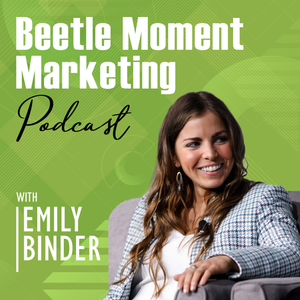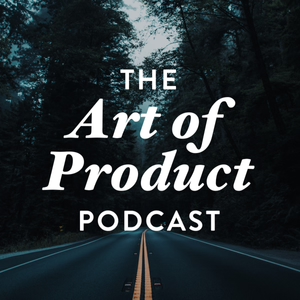
20VC: The Memo: Never Before Revealed Metrics; A Full Breakdown of Unit Economics Behind JOKR, How Does Emerging Markets Compare to Developed Economies & The Biggest Misnomers on Quick Commerce with Ralf Wenzel, Founder & CEO @ JOKR
01/12/22 • 44 min
2 Listeners
Ralf Wenzel is the Founder & CEO @ JOKR, a global platform for instant retail delivery at a hyper-local scale serving both the US and LATAM. Ralf has raised over $260M for the company, most recently valuing it at $1.2BN. Prior to JOKR, Ralf spent 7 years as the Founder & CEO @ foodpanda, as well as, enjoying roles as Chief Strategy Officer @ Delivery Hero, Interim Chief Product and Experience Officer @ WeWork and even moving to the other side of the table as a Managing Partner with Softbank.
In Today’s Episode with Ralf Wenzel You Will Learn:1.) What is the unit economic breakdown for quick commerce business models? What levers can be used to improve it over time?
2.) Comparing the US to LATAM:
- What is the AOV (average order value) in the US vs LATAM?
- What is the order frequency in the US vs LATAM?
- How does labour cost vary when comparing LATAM to the US?
- How does real estate cost for fulfilment centres differ when comparing LATAM to the US?
- How do product margins on a per product basis differ when comparing US to LATAM?
3.) New Market Growth and Maturation:
- What is the payback period for new markets? How has this changed over time?
- How does the payback period reduce with every new market being opened?
- What % of AOV is spent on marketing when a new market is opened? How does this marketing spend change over time?
- In mature markets, how much new customer acquisition is organic vs paid?
- What is the average weekly growth rate in new vs mature markets?
4.) Business Model Expansions:
- How does Ralf and JOKR approach the potential for private label goods?
- How does private label change the margin structure of the goods?
- What have been their lessons from starting their first private label goods?
- How does Ralf approach the ability to integrate advertising and paid search?
- What is needed for paid search and advertising to be a meaningful part of the business?
Ralf Wenzel is the Founder & CEO @ JOKR, a global platform for instant retail delivery at a hyper-local scale serving both the US and LATAM. Ralf has raised over $260M for the company, most recently valuing it at $1.2BN. Prior to JOKR, Ralf spent 7 years as the Founder & CEO @ foodpanda, as well as, enjoying roles as Chief Strategy Officer @ Delivery Hero, Interim Chief Product and Experience Officer @ WeWork and even moving to the other side of the table as a Managing Partner with Softbank.
In Today’s Episode with Ralf Wenzel You Will Learn:1.) What is the unit economic breakdown for quick commerce business models? What levers can be used to improve it over time?
2.) Comparing the US to LATAM:
- What is the AOV (average order value) in the US vs LATAM?
- What is the order frequency in the US vs LATAM?
- How does labour cost vary when comparing LATAM to the US?
- How does real estate cost for fulfilment centres differ when comparing LATAM to the US?
- How do product margins on a per product basis differ when comparing US to LATAM?
3.) New Market Growth and Maturation:
- What is the payback period for new markets? How has this changed over time?
- How does the payback period reduce with every new market being opened?
- What % of AOV is spent on marketing when a new market is opened? How does this marketing spend change over time?
- In mature markets, how much new customer acquisition is organic vs paid?
- What is the average weekly growth rate in new vs mature markets?
4.) Business Model Expansions:
- How does Ralf and JOKR approach the potential for private label goods?
- How does private label change the margin structure of the goods?
- What have been their lessons from starting their first private label goods?
- How does Ralf approach the ability to integrate advertising and paid search?
- What is needed for paid search and advertising to be a meaningful part of the business?
Previous Episode

20VC: Former Governor of the Bank of England, Mark Carney on Why "Only the Niche Will Survive" in Crypto, How Governments and Central Banks Retain Control in a World of Decentralised Finance & The Winners and Losers in Crypto Exchanges and NFTs
Mark Carney is Vice Chair of Brookfield Asset Management and Head of Transition Investing. Prior to Brookfield, Mark served as the Governor of the Bank of England from 2013 to 2020, and prior to that as Governor of the Bank of Canada from 2008 until 2013. Mark was also Chairman of the Financial Stability Board from 2011 to 2018. Mark is a long-time and well-known advocate for sustainability and is currently the United Nations Special Envoy for Climate Action and Finance. If that was not enough, Mark serves on numerous other boards including Stripe, Bloomberg Philanthropies and the Foundation Board of the World Economic Forum to name a few.
In Today’s Episode with Mark Carney You Will Learn:1.) How Mark made his entrance into the world of finance and came to the role of Governor of the Bank of Canada? How did that role lead to his becoming Governor of the Bank of England? How did seeing multiple booms and busts impact Mark's investing mindset?
2.) Governments, Central Banks and Regulation:
- How do governments and central banks retain control in a completely decentralized financial world?
- Can traditional currencies and digital currencies peacefully co-exist?
- What are Mark's predictions for central bank digital currencies?
- How does Mark expect governments and central banks to regulate digital currencies in the coming years?
3.) The Winners and Losers:
- What does the future hold for crypto exchanges?
- How do competitors for digital gold perform?
- Why does Mark believe in crypto "only the niche will survive"?
- What does the rise of Defi mean for traditional banks? What will determine those that survive?
- What does Mark mean when he says the winners will decide "what is my interface with this crypto world?''
4.) The Future of NFTs:
- Do NFTs do more to help or to harm income inequality?
- How does Mark see the future for the development and experimentation of NFTs?
- Who are the winners and losers in the next decade for NFTs?
- How does Mark feel about the pause between productivity gains and real wage benefits that exist today?
Mark’s Favourite Book: Arcadia by Tom Stoppard
Next Episode

20VC: Opensea Founder, Devin Finzer on Scaling GMV from $150M to $3BN in 18 Months, How Brands and Celebrities Will Harness NFTs To Change Their Business, The Impact of NFTs on Gaming & What is in Devin's Metamask Wallet?!
Devin Finzer is the Founder & CEO @ Opensea, the world's first and largest NFT marketplace allowing you to discover, collect, and sell extraordinary NFTs. To date, Devin has raised over $423M for the company with their last $300M round valuing Opensea at $13.3BN. Before changing the world of NFTs, Devin co-founded ClaimDog which was acquired by Credit Karma and before founding ClaimDog, Devin was an engineer at Pinterest. Do want to say, I always love Semil Shah's startup of the year, for 2021 it was Opensea, check out his piece here.
In Today’s Episode with Devin Finzer You Will Learn:1.) How Devin made his way into the world of NFTs and came to found the first and largest NFT marketplace in the form of Opensea?
2.) The Scaling Story:
- What were the first early signs that Opensea was working when they were in YC? What core metrics did they look at to determine success?
- Given NFTs not being "hot" at the time, how was the fundraising process for Opensea coming out of YC? What were the early investors most excited about?
- What was the inflection point when Opensea and NFTs really started to take off? What most surprised Devin about the way in which the inflection point happened?
- When scaling from $150M to $4BN in GMV, what are the first things to break in a company?
- How does Devin maintain company morale with such volatile crypto and NFT markets?
3.) The Next Decade of NFTs:
- How does Devin predict large brands and companies will utilise NFTs for their businesses?
- In what ways does Devin think creators and celebrities will use NFTs moving forward to create more efficient business models?
- How does Devin respond to the statement, "NFTs do more to harm than help income inequality?"
- What are Devin's biggest concerns moving forward when analysing the NFT market?
- How does Devin see the future for the development and experimentation of NFTs?
4.) The Future of NFT & Gaming:
- How does Devin see NFTs impacting the world of gaming most?
- How does Devin think about interacting with these gaming communities that are external to the centralised Opensea marketplace?
Devin’s Favourite Book: Homo Deus: A Brief History of Tomorrow
If you like this episode you’ll love
Episode Comments
Generate a badge
Get a badge for your website that links back to this episode
<a href="https://goodpods.com/podcasts/the-twenty-minute-vc-20vc-venture-capital-startup-funding-the-pitch-37836/20vc-the-memo-never-before-revealed-metrics-a-full-breakdown-of-unit-e-18885245"> <img src="https://storage.googleapis.com/goodpods-images-bucket/badges/generic-badge-1.svg" alt="listen to 20vc: the memo: never before revealed metrics; a full breakdown of unit economics behind jokr, how does emerging markets compare to developed economies & the biggest misnomers on quick commerce with ralf wenzel, founder & ceo @ jokr on goodpods" style="width: 225px" /> </a>
Copy




